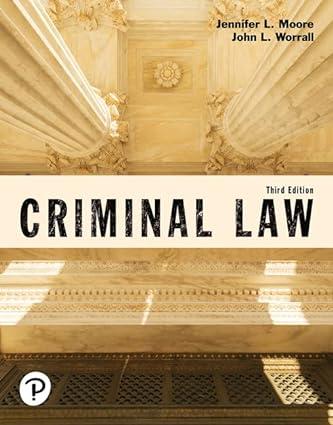Question
Fred Bloggs, a 31-year-old unemployed labourer, was observed by a police officer about a block from the scene of a break and enter. Fred was
Fred Bloggs, a 31-year-old unemployed labourer, was observed by a police officer about a block from the scene of a break and enter. Fred was walking unsteadily and appeared to be intoxicated. The officer stopped Fred and asked his name, address and where he had been. The officer became suspicious because Fred was not taking the most direct way home. He observed that one of the Fred's pockets was bulging and the officer asked Fred to empty it. Fred did and produced a large wad of cash. When questioned as to how much money it was, Fred gave three successive answers: $500, $632 and $832, all of which were incorrect.
Fred was then asked to accompany the police officer to the scene of the break and enter. Fred agreed and was driven to the scene in the locked police car. Once there, the police were unable to determine how much money was missing. Lacking grounds to arrest for breaking and entering, the police arrested Fred for public intoxication, read him his rights and placed him in a cell. Meanwhile the police continued the break and enter investigation and confirmed that the money stolen was in the approximate amount found in Fred's pocket ($1,041). Fred was then arrested for breaking and entering. Subsequently, glass particles were found in the cuffs of Fred's jeans, which matched the glass of the broken door in the during the breaking and entering.
Fred employs you as his defence counsel. You are preparing for trial. Answer the following questions so that you can use it during trial to address the following questions:
- Which, if any, of Fred's Charter rights might have been infringed? How, and is it worth arguing the point?
- You know the officer intends to testify regarding Fred's statements about how much money he had. What arguments could you make to have that evidence excluded?
- Will the glass particles found in Fred's pant cuffs be admissible? Why or why not?
- While in his cell, Fred told a cell mate that he had "been involved in the heist but only as a lookout and that his buddy George had made the entry, forced the till and given Fred the money as he (George) had exited the house". George is George Smith, known to the police as an associate of Fred. How can this statement be used, if at all?
- Fred was convicted when he was 19 of possession of marijuana. Fred has informed you that since that time he has led an exemplary life (e.g. he coaches little league baseball, is a big brother, and raises funds at bingos for underprivileged youth). He wants you to call witnesses to attest to his good character. What advice would you give him?
Step by Step Solution
There are 3 Steps involved in it
Step: 1
1 Charter Rights Infringement Freds rights under the Canadian Charter of Rights and Freedoms that may have been infringed include Right to be free fro...
Get Instant Access to Expert-Tailored Solutions
See step-by-step solutions with expert insights and AI powered tools for academic success
Step: 2

Step: 3

Ace Your Homework with AI
Get the answers you need in no time with our AI-driven, step-by-step assistance
Get Started


